29 Oct 20 | News and features
[vc_row][vc_column][vc_column_text]
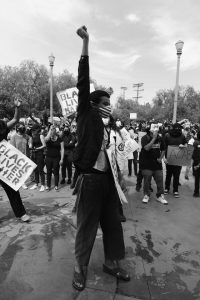
A George Floyd protest in Los Angeles, USA. Credit: Mike Von/ Unsplash
“Blacks known merely to talk about voting in certain towns in Alabama or Mississippi could get fired or have their businesses wrecked.”
This was six decades ago but harassment of black voters continues in today’s USA, writes acclaimed author Darryl Pinckney in his book Blackballed: The Black Vote and US Democracy. Originally published in 2016, the book has been republished this October with a new essay reflecting on Juneteenth, racial justice and protest in the context of Covid-19 and the death of George Floyd.
Pinckney, speaking to Index just days before the US elections on 3 November, says harassment can take several forms.
“You can have a boss who thinks you’re going to vote the way he doesn’t like, so he will tell you things that aren’t true. If you don’t have the resources or the imagination to look it up yourself you will believe him. [The boss might say] that if you owe child support and you to the polls they will arrest you when they have your name. And so you won’t go.”
Pinckney adds: “Election day is not a [public] holiday. It would be difficult to document but some bosses tell people ‘If you’re not back in an hour you’re fired’. You can’t wait in line – you’ll lose your job.”
Intimidation, he says, also happens at the polling station, all of which has contributed to low voter turnout in 2016, particularly amongst black people living in the key swing states. It’s for this reason, as Index reported earlier this year, that many organisations have emerged dedicated to improving transparency and information around how to vote.
As news comes in that already 70 million people have voted early, we may finally be seeing a positive shift, or at least a return to 2012 when Pinckney says an “enormous black voting block” contributed to Barack Obama’s second term win.
“There’s much better information today,” said Pinckney. “People are so alert to the possibilities of intimidation and voter suppression.”
“Early voter turnout is so overwhelming, probably for a number of factors, one being not trusting the process entirely so wanting to get in there. People are standing in line, two hours, three hours, five hours,” he said.
Pinckney believes that the protests surrounding the death of George Floyd have also played a role in this early voter turnout. We discuss how several years ago Index published an article from one of the leaders of Occupy Wall Street in which he was concerned that the movement would not have a lasting impact (compared to the rights movements of the 60s and 70s, he felt that the ease of gathering a crowd today due to the internet actually worked against its long-term goals). Pinckney believes that this year’s protests have managed to bypass this problem somewhat.
“The huge early voter turnout and maybe a higher youth vote than ever is a direct result of signing people up at the George Floyd protests. People were turning the protests into a registration drive,” he said, adding:
“The walk from the street to the voting booth got a lot shorter this summer.”
While Pinckney doesn’t know what exactly will happen this coming Tuesday, he says that he lives “with an optimist and so I have latched onto his wagon”.
“You have to not be a prisoner of history and know that history is manmade.”
Pinckney has written before about “Afro-Pessimism”, the deliberate withdrawal of political and social consciousness by black people. Today the situation feels different.
“I think that the Black Lives Matter movement and the police protests and by extension this examination of the part racism plays and how society is constructed is very much not Afro-Pessimism,” he said.
“A kind of activism is in the air.”
At the end of Blackballed Pinckney writes that there “are new names to learn: Li Wenliang, and then Joshua Wong, Agnes Chow, Shu Kei, Nathan Law, Isaac Cheng. We must act out our freedom, one masked, unnamed girl said in English to a camera during demonstrations on the anniversary of Hong Kong’s handover to China.”
What made Pinckney chose to highlight those who have been persecuted by the Chinese government as a note to end on?
“The George Floyd protests were global. But look who is really up against it, look who is putting themselves and everything, their lives, on the line. These really innocent-looking people in Hong Kong. They’re up against this authoritarian state. You must remember them and their names.”
He adds:
“That kind of state is around the corner for a lot of us if we don’t say something now.”
Darryl Pinckney is the author of High Cotton, Black Deutschland, Out There and Busted in New York and Other Essays. His 2016 book Blackballed: The Black Vote and US Democracy has just been republished with a new essay for October 2020. [/vc_column_text][/vc_column][/vc_row]
27 Oct 20 | News and features, United States
[vc_row][vc_column][vc_single_image image=”115312″ img_size=”full” add_caption=”yes”][vc_column_text]A proposal by the Department of Homeland Security, USA, to limit visas to journalists has been widely condemned by free speech groups.
The proposed changes will require foreign media and journalists to apply for an eight-month visa with a further maximum extension of another 240 days.
Many foreign journalists working in the USA use the so-called “I” visa, which is vital to upholding scrutiny and media freedom from across the world in one of the world’s leading powers.
Dominic Ponsford, editor-in-chief of media-focused magazine Press Gazette, spoke of his concerns with the changes which he described as “an alarming development” and how they reflect the increasingly difficult situation for journalists in the USA.
“There have been concerns about the treatment of journalists increasing over the last four years,” he told Index. “The latest changes are an alarming development.”
“The I visa is a good scheme, although tricky to get hold of. Once you have it, it provides a lot of security and predictability for journalists.”
Under the current rules, the visa allows for a term of one year, but each holder may reapply for an unlimited amount of time. It is this particular change that Ponsford believes will cause problems for journalists.
“The concern with the time limit is the threat of having it rescinded, meaning journalists will constantly be looking over their shoulder. You may not have it renewed if your journalism is not complimentary to the administration.”
Press freedom in the USA has been under increasing threat during President Donald Trump’s four years in power. The difficult situation has intensified since the killing of George Floyd in May, which caused mass outrage and tensions between citizens and law enforcement.
The US Press Freedom Tracker has logged 219 journalists attacked, 62 equipment damages, 71 journalists arrested and over 10 occasions where equipment was searched or seized in this year alone.
Non-profit organisation the American Civil Liberties Union (ACLU) campaigns to protect US citizens’ civil liberties enshrined in the constitution and have been deeply critical of the proposed changes.
A spokesperson for the union said: “This proposal is going to hamper the ability of foreign media outlets to report from the United States, by arbitrarily limiting foreign correspondents to a short period of stay.”
Civil liberties are protected by the First Amendment of the constitution. ACLU believes the proposal is a clear attempt by the current administration to “chill reporting that might hold it accountable.”
“There is no legitimate justification for this proposal and no problem that it is solving. It is critically important that people in America have access to information from a wide range of media operating independently of the government.”
“The US government cannot take actions that are intended to chill reporting that might hold it accountable. The administration should abandon this attempt.”
The likelihood of the proposed changes being pushed through is difficult to determine. With the presidential election on 3rd November looming large, there is a chance these proposals will not manifest. However, with the election being set to be very contentious, with controversy already surrounding the mail-in ballot system, nothing right now is certain.
Should the Trump administration secure four more years, these proposals will almost undoubtedly become law, if they do not already do so in the last three months of the current government. Journalists globally will all be the worse of for it.[/vc_column_text][/vc_column][/vc_row][vc_row][vc_column][three_column_post title=”You may also like to read” category_id=”5641″][/vc_column][/vc_row][vc_row][vc_column][/vc_column][/vc_row]
23 Oct 20 | Africa, News and features, Tanzania
[vc_row][vc_column][vc_single_image image=”115317″ img_size=”full” add_caption=”yes”][vc_column_text]On 28 October, Tanzania goes to the polls. The election will see the Tanzanian people choose a new president, members of parliaments for the mainland as well as Zanzibar and local councillors.
If the elections are free and fair, there is no reason to believe that the incumbent president John Magufuli will not be returned to power. He has a commanding lead in the opinion polls – independent surveys say that 80 per cent of people on the mainland and 71 per cent in Zanzibar are going to vote for him.
Magufuli came to power in 2015, promising to reduce government corruption and spending. He also vowed to increase investment in the country’s industries. He represents the Chama Cha Mapinduzi (CCM) party that has been in power ever since 1961 when the country gained independence from Britain.
Since his election, Magufuli has been seen to be tough on corruption, particularly related to the mining sector which generates significant incomes for the country.
In 2017, Magufuli presented London-based Acacia with a US$190 billion bill for back tax related to metallic ores exported from the country. The company denied any wrongdoing but its Canadian parent opted to pay the country US$300 million to settle the claims and agreed to share the economic benefits more equitably.
There is also a feeling that Magufuli has handled the Covid pandemic well, although many believe that the country’s statistics do not tell the real story.
At a church service in June, Magufuli claimed that coronavirus had been “removed by the powers of God”.
The number of cases in the country has been stuck at 509 for weeks though that has more to do with the country not releasing official statistics rather than the virus being defeated. Opposition figures claim the true figure is in the tens of thousands and that hundreds have died.
The president clearly has no confidence in the country’s testing regime. Earlier this year he suspended the head of the country’s national health laboratory in charge of coronavirus testing after it was claimed that secret tests carried out on animals, fruits and vehicle oil at the laboratory had tested positive for Covid.
“People genuinely believe he has handled Covid well,” said one person who has had close political and business links with Tanzania for more than 30 years, speaking on condition of anonymity. “His view has been that people in Tanzania would suffer much more from having a lockdown rather than having a few cases and people been getting on with life as normal.”
Part of this may be due to the fact that Tanzania is relatively young – just 3.8 per cent of the country’s 60 million population are aged 65 or over and more likely to die from the disease.
“When infections were higher back in May, people did a lot of traditional remedies, and there was a lot of reliance on local knowledge then, and prayer, and then when things got better people relaxed a bit more,” says Tanzanian poet and writer Neema Komba.
The presence of mass crowds at political gatherings, usually without masks, is perhaps a sign that Covid is no longer considered a serious risk in the country, whatever the truth is about a virus that has killed more than a million people worldwide.
She says that Tanzanians are very aware of individual responsibility.
“There is a saying in Swahili that really reflects the attitude – ‘za kuambiwa changanya na za kwako’ – which means something like what you are told you should analyse on your own”.
Tanzania’s economy is not doing too badly either.
In the 1980s, it was one of the poorest countries in the world. In the middle of that decade, the country embarked on a liberalisation programme under President Ali Hassan Mwinyi which removed price controls, reduced the budget deficit and restructured many of the country’s state-owned enterprises. It has now jumped above many of its fellow African nations in terms of GDP, averaging growth of more than six per cent every year since 2000. This year, growth may fall to between 1.9 and 4 per cent.
The influential businessman with political connections who spoke to Index said, “Magufuli will win this easily. He has a lot of support from people who are fed up with inequalities and fed up with greed that some politicians have shown in the past. The Tanzanian people believe he is generally on their side and that those who are barred form standing have probably got it coming to them.”
Yet the key question is still, will the elections be free and fair?
Magufuli himself vowed in January that the elections would be free and fair but opposition politicians are not convinced. The main opposition party Chadema (Party for Democracy and Progress) has had hundreds of its candidates for parliament and councils disqualified.
Chadema presidential candidate Tundu Lissu was prevented from campaigning for seven days in early October by the NEC for allegedly contravening election rules while Zanzibar’s commission suspended campaigning by ACT Wazalendo candidate Maalim Seif.
Both have been accused of using ‘seditious’ or ‘inciting’ language and some feel that it is only opposition candidates that are picked up on this.
NEC director Dr Wilson Mahera told Tanzania’s Daily News that candidates needed to follow the regulations.
“A leader who continues causing public fears, uttering seditious words may find himself/herself out of the list of candidates before polling date,” said Dr Mahera.
There is a changing mood in the country relating to the media.
The country has typically done well on RSF’s World Press Freedom Index compared to many of its near neighbours. The media has generally been free in the country, particularly under Benjamin Mkapa who ruled the country from 1995 to 2005. Mkapa worked as managing editor of a number of newspapers in the country in the mid-60s to early 70s before starting his political career as press secretary under Julius Nyerere, who took Tanzania to independence.
However, this year the government has tightened up laws which bars Tanzanian broadcasters from airing national or international content on their platforms without prior permission from the government
In June, the government withdrew the licence of newspaper Tanzania Daima for “extreme and repetitive” offences that violate the country’s laws and journalistic ethics.
In July, the government began a crackdown on the use of social media. The Electronic and Postal Communications (Online Content) Regulations 2020 bans “news, statements or rumours for the purpose of ridicule, abuse or harming the reputation, prestige or status of the United Republic, the flag of the United Republic, the national anthem or the United Republic’s symbol, national anthem or its logos”.
“Social media is an interesting space,” says Komba. “I would say there are various Tanzanias on social media but then perhaps it is about the algorithms that show you what you want to see. From my observations, if you are on Twitter, you will get more political discussions, while Facebook and Instagram are completely different and then you have spaces like Jamii forums where people voice their opinions more boldly and WhatsApp where people have more private discussions.”
She added, “The cybercrime act has made it quite challenging for people to freely express themselves. So, perhaps we need to ask ourselves, what aren’t people saying?”
Magufuli has been tough on corruption in the mining sector which has given him popular appeal.
Despite this crackdown, Komba says there seem to be positive steps to make the elections freer than in the past.
“Tanzania has invited international observers and we hope that these observers will give us the answers about the fairness and freeness of the elections, but unfortunately, we only get this information after elections are done. The National Electoral Commission has also allowed the use of alternate IDs in case of voter ID loss, which is also something positive. And, there is still voter education given by various stakeholders.”
Our interviewee said, “Magufuli could easily be re-elected in an completely open and transparent way but people in the CCM are paranoid about the opposition. The concept of a loyal opposition is not one that is deeply embedded.”
If Magufuli wins re-election for a second term – as all of his predecessors since independence have done – then the question is what next? Will he attempt to change the constitution so that he could remain in power as others have done elsewhere in the world?
He added: “I am pretty sure that even if he wanted to, there are enough ambitious and powerful people in the CCM who want their turn at the presidency.”
[/vc_column_text][three_column_post title=”You might also like to read” category_id=”540″][/vc_column][/vc_row]
23 Oct 20 | Opinion, Ruth's blog
[vc_row][vc_column][vc_single_image image=”115302″ img_size=”full” add_caption=”yes”][/vc_column][/vc_row][vc_row][vc_column][vc_column_text]Samuel Paty
An educator.
A father.
A martyr.
An inspiration.
Last week Professor Paty was brutally murdered in a Parisian suburb for teaching his students about the basic human right of free speech. A right that is protected by both the French constitution and the European Human Rights Act. A right that we cherish and celebrate.
Our hearts bleed for the pain and sorrow that this tragedy has visited upon his loved ones and the people of France. We stand with them.
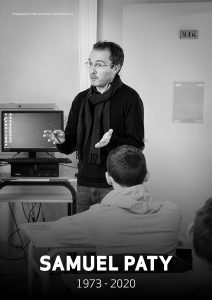
Samuel Paty, photo: Ville de Conflans Saint Honorine
No context is or should be required to try and understand this horrendous act. There are no excuses, justifications or mitigations. Professor Paty was doing his job. He was a citizen of the world, educating the next generation about the importance of speech, of language, imagery and art, and their protected place in society. This was a public service undertaken in a public space. He was doing his duty and he was assassinated for it.
As we mourn Samuel’s loss, 14 French citizens are on trial for the massacre at the Charlie Hebdo offices. A further seven people have been arrested related to Samuel’s murder. These people do not represent France. Samuel Paty represents France. These people represent extremists. Samuel Paty represents the mainstream. Those arrested represent hate and fear. Samuel Paty represents hope.
There will be lots or recriminations in the months and years ahead: politicians attempting to exploit people’s fears for their own gain, others trying to excuse or apologise. Neither is acceptable. As a society, it is vital that we come together to celebrate our shared values, in spite of every effort made by some to undermine and attack those values.
In the months ahead Index will continue to report on the Charlie Hebdo case. We will highlight the efforts of French leaders who, in the face of terror, stand tall and use their free speech to protect ours.
And most importantly we will remember.
Samuel Paty, 1973-2020.
He will never be forgotten. We mourn his loss together and we must remember his legacy every time someone tries to undermine or restrict our free speech.[/vc_column_text][/vc_column][/vc_row][vc_row][vc_column][three_column_post title=”You might also like to read” category_id=”581″][/vc_column][/vc_row]
22 Oct 20 | Free Speech and the Law, News and features, Uncategorized, United States
[vc_row][vc_column][vc_column_text]

Rachel Malehorn, WikiCommons
As Amy Coney Barrett’s nomination to the Supreme Court advances to the Senate – despite a boycott from Democrats – it is still unclear where she stands on free speech.
Coney Barrett did little to allay fears over her positions on key constitutional issues during her confirmation hearings for the vacant seat on the US Supreme Court.
Members of the Senate Judiciary Committee questioned the judge on issues including free speech and the First Amendment.
The First Amendment gives five separate protections to citizens. Namely the freedoms of speech, religion, press, protest and redress.
When asked by Republican Senator Ben Sasse what the freedoms protected by the amendment are, Coney Barrett was unable to recall the latter.
The freedom of redress gives citizens of the USA the right to petition or complain to government authorities at the federal, state and local level without fear of reprisals or punishment. It is a vital part of the constitution and very much a contemporary issue.
There has been extra scrutiny on issues around the First Amendment ever since the protests against the killing of George Floyd broke out in May this year.
With the typical rigour of judicial committee hearings, Coney Barrett could be forgiven for what was likely an innocent slip-up. However, the response will have done little to calm the nervousness over her appointment from free speech campaigners and members of the press.
The judge, 48, does not have an extensive record on dealing with with issues of First Amendment freedoms and her position on them has therefore been difficult to interpret.
On whistleblower cases, for example, Coney Barrett has joined different sides of the debate in different cases.
In August this year, Coney Barrett’s court favoured the First Amendment and the right of a public employee to raise alarm. However, in the case of Kelvin Lett, a Chicago investigator who refused to change a police report under direction from his supervisor, Coney Barrett ruled: “Lett may have had a good reason to refuse to amend the report [but this] does not grant him a First Amendment cause of action.”
On other issues, Coney Barrett was repeatedly accused of being “evasive” during the hearings, particularly on more controversial matters; the Democrats have repeatedly alluded to her Catholic faith as a potential problem.
However even before her nomination, she has expressed her belief in the importance of the separation of church and state.
“I think one of the most important responsibilities of a judge is to put their personal preferences and beliefs aside. Our responsibility is to adhere to the rule of law,” she said.
The Trump administration has faced repeated criticism from free speech groups since taking office in 2016. Among the criticisms are the crackdown on Black Lives Matter protests across the country, as well his repeated attacks on press freedoms.
Index, along with other free speech organisations have raised concerns over harms to media freedom in the country and in particular since the outbreak of the coronavirus pandemic.
The US Press Freedom Tracker has logged 219 journalists attacked, 62 equipment damages, 71 journalists arrested and over 10 occasions where equipment was searched or seized in this year alone.
As Trump’s Supreme Court nominee, these issues naturally fell on Coney Barrett to talk at length on during the hearings, but she gave little insight into her stance on media freedom.
Coney Barrett’s addition would give the Supreme Court a 6-3 conservative majority, heightening concern over the consequences of Trump’s potential election victory and the impact on policy should Joe Biden win instead.[/vc_column_text][/vc_column][/vc_row]
19 Oct 20 | News and features
[vc_row][vc_column][vc_column_text]
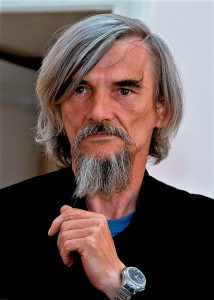
Russian historian Yuri Dmitriev, who has been imprisoned following research into murders committed by Stalin. Credit: Mediafond/Wikimedia
Western democracies have expressed concern and outrage, at least verbally, over the Novichok poisoning of Alexei Navalny—and this is clearly right and necessary. But much less attention is being paid to the case of Yuri Dmitriev, a tenacious researcher and activist who campaigned to create a memorial to the victims of Stalinist terror in Karelia, a province in Russia’s far northwest, bordering Finland. He has just been condemned on appeal by the Supreme Court of Karelia to thirteen years in a prison camp with a harsh regime.
The hearing was held in camera, with neither him nor his lawyer present. For this man of sixty-four, this is practically equivalent to a death sentence, the judicially sanctioned equivalent of a drop of nerve agent.
After an initial charge of child pornography was dismissed, Yuri Dmitriev was convicted of sexually assaulting his adoptive daughter. These defamatory charges appear to be the latest fabrication of a legal system in thrall to the FSB—a contemporary equivalent, here, of the nonsensical slander of “Hitlerian Trotskyism” that drove the Great Terror trials. It is these same charges, probably freighted with a notion of Western moral decadence in the twisted imagination of Russian police officers, that were brought in 2015 against the former director of the Alliance Française in Irkutsk, Yoann Barbereau.
I met Yuri Dmitriev twice: the first time in May 2012, when I was planning the shooting of a documentary on the library of the Solovki Islands labor camp, the first gulag of the Soviet system; and the second in December 2013, when I was researching my book Le Météorologue (Stalin’s Meteorologist, 2017), on the life, deportation, and death of one of the innumerable victims murdered by Stalin’s secret police organizations, OGPU and NKVD.
In both cases, Dmitriev’s help was invaluable to me. He was not a typical historian. At the time of our first meeting, he was living amid rusting gantries, bent pipes, and machine carcasses, in a shack in the middle of a disused industrial zone on the outskirts of Petrozavodsk—sadly, a very Russian landscape. Emaciated and bearded, with a gray ponytail, he appeared a cross between a Holy Fool and a veteran pirate—again, very Russian. He told me how he had found his vocation as a researcher—a word that can be understood in several senses: in archives, but also on the ground, in the cemetery-forests of Karelia.
In 1989, he told me, a mechanical digger had unearthed some bones by chance. Since no one, no authority, was prepared to take on the task of burying with dignity those remains, which he recognized as being of the victims of what is known there as “the repression” (repressia), he undertook to do so himself. Dmitriev’s father had then revealed to him that his own father, Yuri’s grandfather, had been shot in 1938.
“Then,” Dmitriev told me, “I wanted to find out about the fate of those people.” After several years’ digging in the FSB archive, he published The Karelian Lists of Remembrance in 2002, which, at the time, contained notes on 15,000 victims of the Terror.
“I was not allowed to photocopy. I brought a dictaphone to record the names and then I wrote them out at home,” he said. “For four or five years, I went to bed with one word in my head: rastrelian—shot. Then, I and two fellow researchers from the Memorial association, Irina Flighe and Veniamin Ioffe (and my dog Witch), discovered the Sandarmokh mass burial ground: hundreds of graves in the forest near Medvejegorsk, more than 7,000 so-called enemies of the people killed there with a bullet through the base of the skull at the end of the 1930s.”
Among them, in fact, was my meteorologist. On a rock at the entrance to this woodland burial ground is this simple Cyrillic inscription: ЛЮДИ, НЕ УБИВАЙТЕ ДРУГ ДРУГА (People, do not kill one another). No call for revenge, or for putting history on trial; only an appeal to a higher law.
Memorials to the victims of Stalin’s Terror at Krasny Bor, Karelia, 2018; the remains of more than a thousand people shot between 1937 and 1938 at this NKVD killing field were identified by Dmitriev, using KGB archival records
Not content to persecute and dishonor the man who discovered Sandarmokh, the Russian authorities are now trying to repeat the same lie the Soviet authorities told about Katyn, the forest in Poland where NKVD troops executed some 22,000 Poles, virtually the country’s entire officer corps and intelligentsia—an atrocity that for decades they blamed on the Nazis. Stalin’s heirs today claim that the dead lying there in Karelia were not victims of the Terror but Soviet prisoners of war executed during the Finnish occupation of the region at the beginning of World War II. Historical revisionism, under Putin, knows no bounds.
I am neither a historian nor a specialist on Russia; what I write comes from the conviction that this country, for which I have a fondness, in spite of all, can only be free if it confronts its past—and to do this, it needs courageous mavericks like Yuri Dmitriev. And I write from the more personal conviction that he is a brave and upright man, one whom Western governments should be proud to support.
This article was translated from the French by Ros Schwartz. It was originally published on the New York Review of the Books here under the headline Yuri Dmitriev: Historian of Stalin’s Gulag, Victim of Putin’s Repression.
Read our article exploring Dmitriev’s case and how history is being manipulated and erased here.[/vc_column_text][/vc_column][/vc_row]
16 Oct 20 | Opinion, Ruth's blog
[vc_row][vc_column][vc_column_text]
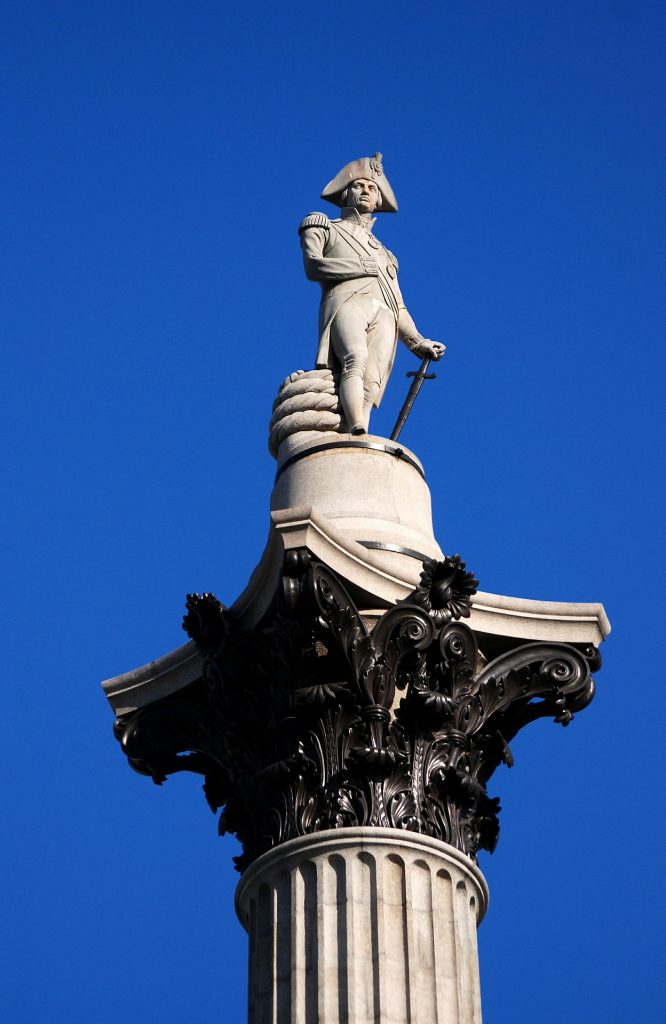
Nelson’s Column, photo: Steve Bidmead/Pixabay
I love journalism. I am addicted to the news and honestly anything that isn’t about the appalling pandemic we are currently living through is usually welcome. But, and it’s a big but, there are some news stories which we know are designed to inflame, to spark a reaction, to act as click-bait and they may or may not always tell the full story. To the uninitiated, they can serve as an excuse to launch a new campaign – to protect our free speech, to launch a ‘culture war’, to drive divisions in our country, so it is incumbent on all of us to explore all sides of a story and try and unearth the truth before we get caught up in the latest clicktavist campaign…
That was definitely the case at the beginning of this week, when Lord Nelson entered the fray – apparently, his role in our national story was under threat, his hero status revoked – because of his links to colonialism and support for slavery. Defence of his reputation would now be the front line in the culture wars. However, it seems that the reality is, as ever, a little more complex.
No one, not even some of our greatest heroes and heroines, is perfect. Those that did extraordinary things for our country may also have held personal views that we would rightly find repugnant today. It serves no one for us to venerate our national heroes as saints; they weren’t, they were just people, extraordinary people. People who we should study in the round and understand their full contribution both good and bad to our national story. And many of them knew that in their own lifetimes:
“Mr Lely, I desire you would use all your skill to paint your picture truly like me, and not flatter me at all; but remark all these roughness, pimples, warts, and everything as you see me.”
When Oliver Cromwell commissioned his portrait from Sir Peter Lely, he was clear that it should bare a true likeness to him and show him for who he was – good and bad.
Many heroes, heroines and villains of history have complex and subjective legacies. A saviour for one will be the oppressor for another and debating and exploring the rights and wrongs of those who are lionised or vilified is key to understanding both our own history and the current composition of our society.
Unfortunately for some this isn’t the case. We seemingly now live in a world where the phrase ‘culture wars’ has, for some, become a proxy for those seeking not to engage in debate but to silence disagreement or dissent. Individuals and self-organised groups have proclaimed themselves the sole arbiters of truth. They decide what the ‘correct’ view is and any attempt to deviate from that singular set of ordained truths is denounced and deplored by those for whom the complex nature of individuals and historic events are just too difficult.
Which brings me back to Lord Horatio Nelson. When a freedom of information request to the National Maritime Museum discovered that the curators of their exhibitions had discussed reflecting the contemporary issues raised by the Black Lives Matter movement in their exhibits, the world exploded. One MP decried in response: “We are fighting this left-wing ideological nonsense every single day in this country.”
And the newly formed “Common Sense Group” of MPs took to their social media to denounce any deviation from the national narrative as an affront to all things British. Their intent was clear: to prevent a museum from publishing or promoting something that they didn’t agree with. This is a form of censorship and it wasn’t even based on fact.
Beyond the anger, the truth about this exhibition was a very different story. You only had to spend three minutes listening to Paddy Rogers, the director of the Royal Museums Greenwich to realise, as he said, that this was a “storm in a tea clipper”. Nelson remains a much-loved figure at the museum and the main exhibits will do nothing to undermine that, rather they will use his persona as a mechanism to explore our current identity and British values.
But the reality isn’t the key aspect here; Nelson’s legacy isn’t the issue, but rather the concept of “culture war” is, with some people trying to build a narrative which sows division and instills a chilling effect on our public space. History is not set in stone. After all, many people’s stories are never told and our perceptions rightly change as we discover more about people’s journeys. Museums and libraries are temples of education and learning. They should be homes for debate and exploration, free from political interference and able to examine every aspect of history and culture without reprisal.
This is especially the case when you consider how some repressive regimes are using their ‘soft’ power to try and launch a real culture war in Europe – using their money and influence to try and re-write history.
In Nantes, France, the Chinese government has intervened to stop an exhibition on Genghis Khan and the Mongols – an issue we’ll be covering more in the weeks ahead. But if we allow one group of people to dictate what should happen in museums, we open the floodgates to all kinds of interested parties to do the same and that is not a path we want to go down.
Here in Britain, we thankfully live in a free society. People are entitled to not go to an exhibition if they think it will offend them, or they can take to social media to write negative reviews of it, but they aren’t allowed to ban it because they don’t agree with the facts presented to them.
Thankfully that isn’t acceptable in a free and tolerant society.[/vc_column_text][/vc_column][/vc_row][vc_row][vc_column][three_column_post title=”You might also like to read” category_id=”581″][/vc_column][/vc_row]
15 Oct 20 | China, India, News and features, Pakistan
[vc_row][vc_column][vc_column_text]The Indian government’s revocation of autonomy for Jammu and Kashmir has been a disaster for free speech.
In October 2019, Narendra Modi’s government rescinded article 370 of the Indian constitution which had given the region special autonomous status since 1954. The region is now run as two separate union territories – Ladakh, and Jammu and Kashmir.
Ever since its autonomy was curtailed, access to information for inhabitants has been greatly reduced.
Despite palpable risks to their safety, journalists in the disputed region have remained, but a lack of access to internet has hindered their progress.
Set in the Himalayas, the region is famously beautiful – often described as “heaven on Earth” – but this is in stark contrast to the fierce and often bloody dispute wracking Jammu and Kashmir.
As the situation worsens, we look back at pieces published in Index magazine and online exploring the impact the conflict has had on free speech, journalists and the people who call Kashmir their home.

Varieties of death, the winter 2002 issue of Index on Censorship magazine.
Journalist and broadcaster Isabel Hilton visited Kashmir in the early 2000s. She documented her experiences in 2002 and spoke of her encounters with Pakistani military.
The piece is an insight into how much of major conflicts can seem underreported, but in fact are not. For journalists working in the region, the daily reports of death tolls and atrocities are both a livelihood and a duty, but only major events tend to make headline news across the world.
She wrote: “In Srinagar, the journalists — themselves constantly threatened and often attacked by both sides — have grown weary of looking for new angles on death. Only the larger outrages — such as the car bomb attack on Srinagar’s assembly building on 1 October last year which claimed more than 30 lives — are reported internationally.”
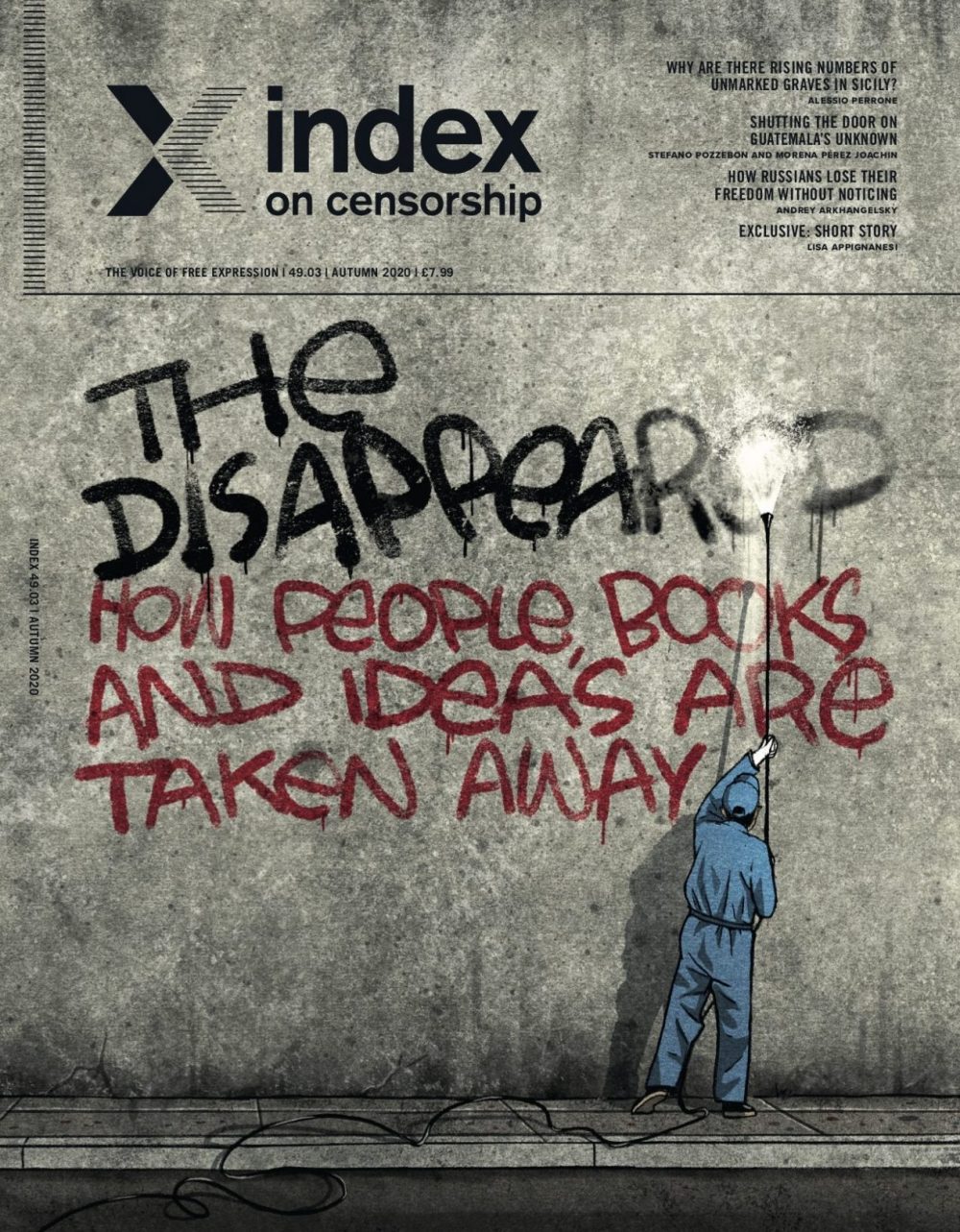
Index on Censorship autumn 2020 issue on the theme of the disappeared
In the most recent edition of Index (which can be read here), Bilal Ahmad Pandow discussed the experiences of journalists in Kashmir.
Since India took control and imposed direct rule, a feeling of (relative) security in the region has been lost and censorship laws have taken a firm grip, he writes.
A new policy for journalists introduced this year by the Jammu and Kashmir government imposes rules on restricting “fake news, plagiarism and unethical or anti-national content”.
“Pressure on media freedom was ratcheted up even further with the introduction of the New Media Policy 2020. Journalists were, of course, already operating under tremendous pressure – harassment, intimidation, the choking of advertisement revenue, imprisonment, draconian laws and a communication blockade – all of which are forcing journalists to self-censor.”
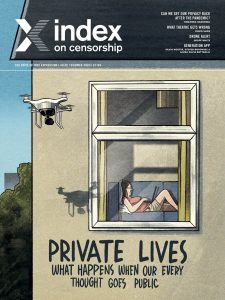
Index on Censorship summer 2020 issue on the theme of privacy
Earlier this year, Kashmiri journalist Bilal Hussain spoke with Index’s Orna Herr on life in the media in the region.
He told Herr of his personal struggles to get copy and videos past online restrictions and out of the country. Journalists have been creative in their attempts to get past the internet blocks designed to limit media freedom, he said.
“Since March 2020, the government allowed restricted internet access that blocked many news websites. So journalists installed VPNs that could break the firewall and enabled journalists to access those websites.”
“Some journalists used to travel to Delhi to access the internet and came back after filing their reports.”
“To get video interviews to my editor in Paris, I put them on a memory stick and gave it to a friend who was travelling to the USA, and he sent it on from there.”

Varieties of death, the winter 2002 issue of Index on Censorship magazine.
Poet Agha Shadid Ali was born in Kashmir in 1949. He moved to the USA in 1976 but his home was always at the forefront of his literary works.
His 1997 work Country Without a Post Office discussed the plight of Kashmir. At the time of their publication, he said: “My entire emotional and imaginative life began to revolve around the suffering of Kashmir.”
Ali died of brain cancer in 2001. Index included two of his poems following the 2002 Kaluchak massacre in which militants attacked a tourist bus, killing 31 people and injuring 47.
[/vc_column_text][/vc_column][/vc_row][vc_row][vc_column][vc_column_text]

Media moguls & megalomania, the September 1994 issue of Index on Censorship magazine
This piece from 1994 by Caroline Moorehead shows how the human rights spotlight was finally being turned onto Jammu and Kashmir.
She writes: “In their war against the militants…the Indian police and security fores have come to treat disappearances with a combination of lethargy, obfuscation and threats, connived at by the judiciary. Court orders are ignored, relatives warned to stop making enquiries, and the case is shifted from place to place while documents are mislaid and those responsible posted to other places.”
It tells the story of the disappearance of 22-year-old Harjit Singh, a far from unusual story in the region.[/vc_column_text][/vc_column][/vc_row][vc_row][vc_column][vc_column_text]
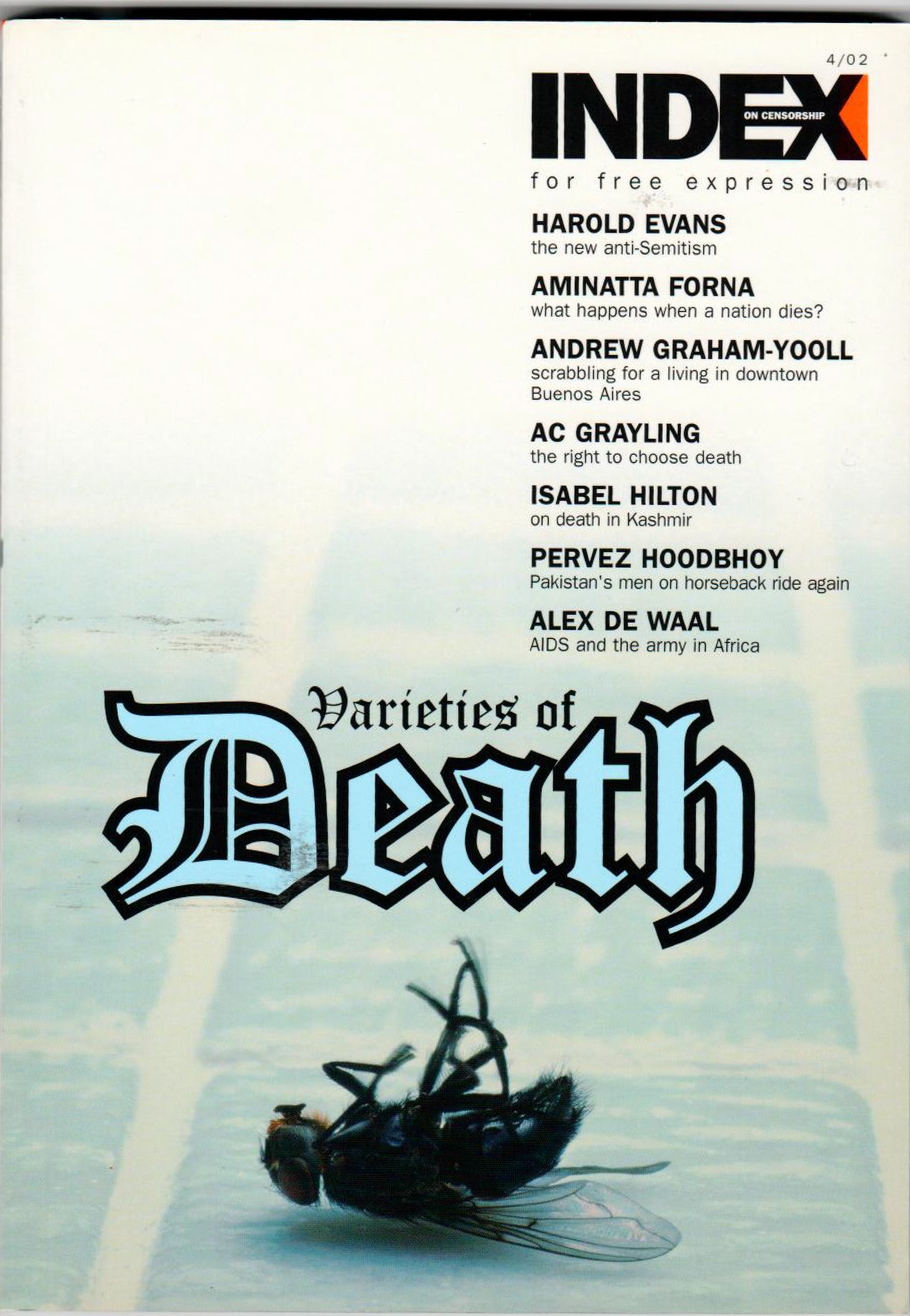
Varieties of death, the winter 2002 issue of Index on Censorship magazine.
Beyond the Gun is a collection of photographs and statements from Kashmiri people in 2002. Its emotive language and testimony from residents who felt betrayed by India’s handling of the region, coupled with photographs of members of the community, make for a stirring read.
By Sheba Chhachhi, each photograph and collected testimony tells a different story. Some, like the words from carpet worker Jana, show the danger of bringing to light the problems caused by local authorities and provides a chilling account of escaping molestation by a border security force soldier.
Jana said: “I faced the power of his gun with the power of my mind. I felt no fear. I had the axe. Had the axe not been there; there was a rolling pin, a ladle. If I had a gun, they would have seized it long ago. These are my own implements. No one can take them away from me.”[/vc_column_text][/vc_column][/vc_row][vc_row][vc_column][vc_column_text]

Partition, the November 1997 issue of Index on Censorship magazine
In 1997, Pakistan and India celebrated 50 years of independence, but continuing tensions between the two muted the festivities.
In this article from that year, Eqbal Ahmad set out the problems caused by a misguided approach to decolonisation by the United Kingdom, which led to the partition of Pakistan and Bangladesh.
Though not specifically about the troubles in Kashmir, much of the hostility between Pakistan and India is thoughtfully explained and ensures a greater understanding of the conflict.[/vc_column_text][/vc_column][/vc_row][vc_row][vc_column][vc_column_text]

Varieties of death, the winter 2002 issue of Index on Censorship magazine.
In this 2002 article, Sidharth Bhatia claims India once had the world’s largest and freest media, something which has now changed. It takes a historical journey explaining chronologically just how India’s media freedom has been squeezed.
Bhathia ponders the problems populist jingoism can have on freedoms, citing the border war in 1999 as a prime example.
“More worrying is the decline in any challenge to the received wisdom on contentious issues such as human rights abuses, especially in Kashmir. This was seen at its most blatant during the border war at Kargil in 1999 between Indian and Pakistani soldiers (disguised as irregulars) who had infiltrated the area.”[/vc_column_text][/vc_column][/vc_row][vc_row][vc_column][three_column_post title=”You may also like to read” category_id=”581″][/vc_column][/vc_row]
14 Oct 20 | News and features
[vc_row][vc_column][vc_single_image image=”115253″ img_size=”full” add_caption=”yes”][vc_column_text]“I was expecting some reaction,” artist and activist Paolo Cirio told Index on Censorship referring to his installation, Capture, which is made up of publicly-sourced photographs of police officers during protests in France. “But this reaction is much more than expected.”
The installation was due to open on 15 October at Le Fresnoy, a public institution for contemporary art in the north of France, but it was withdrawn following pressure from France’s Minister of Interior. In a tweet on 2 October, Minister Gérald Darmanin called Cirio’s work an “unbearable pillorying of women and men who risk their lives to protect us” and demanded that the exhibition be “deprogrammed” under threat of legal action.
Cirio did create a separate online platform to crowdsource the names of the police officers as part of his wider campaign against facial recognition, but the photographs in the installation at Le Fresnoy were to appear without names, dates, times or locations. He insists that the exhibition would have posed no risk to any of the police officers’ privacy.
“I have stated many times that I have done it even to protect their privacy and to show that [facial recognition] is a potential danger to them,” Cirio explained. “It’s dangerous for everyone even for the police.”
Cirio had hoped that Capture would highlight the asymmetry of power related to facial recognition by showing how the technology can be used “against” the same authorities that urge its use. “During protests police are always trying to cover their mask more and more, and cover their identification number or anything that can identify them, while they use facial recognition against the protesters,” Cirio explained.
“The reaction from the general public is also much more than I expected,” Cirio said. “It’s actually pretty tense – every day I get up and I receive very nasty or scary messages”. But he has also been receiving some messages of support. “Of course there are all the antifa or more left-wing people in France who consider me a hero in a way.”
Since his installation was removed from the programme, Cirio said that Le Fresnoy have offered to show just one of the videos from Capture, but none of the photos. “Basically they’re saying ‘we can still show your work but only this video’,” Cirio said. “They are trying to hide the entire part of the project about police by not showing it, by not even discussing it, which of course is not something I am going to accept.”
In a statement, Le Fresnoy’s director Alain Fleischer said that they had told Cirio that they “could never support a project [linked] to a digital platform where the public would be encouraged to identify and name policemen [sic]”. He said that the decision to remove Cirio’s exhibition was prompted not necessarily by the pressure from the interior minister but by the risk of legal prosecution arising from their association with his work.
“[T]hey were two different things,” Cirio said referring to Capture and the online platform crowdsourcing the names of police officers, accusing Le Fresnoy of linking them in order to justify their decision to censor the installation. “The truth is that they feel the pressure to show no photos of police officers at all.”
“Anyway, again I think it’s appropriate to say that the censorship is from the government, not from Le Fresnoy. I don’t have bad blood against them,” Cirio said. “I understand their position. Too bad they couldn’t stand up with me a little longer.”
Cirio is now discussing the case with three French lawyers, who agree that his installation does not violate French law. “They’re actually suggesting that I file a complaint against the interior minister for censorship,” he said.
“It’s very shocking that this is happening in France. Anyone would think that France is the cultural capital of the world and it’s where all the artists are and there’s total freedom of speech and instead it’s not really the case anymore I would say,” Cirio said.[/vc_column_text][/vc_column][/vc_row][vc_row][vc_column][/vc_column][/vc_row]
12 Oct 20 | News and features
[vc_row][vc_column][vc_column_text]Maltese investigative journalist Daphne Caruana Galizia was killed in a car bomb on 16 October 2017.
Before she died, she had made public stories about corruption, money laundering and Malta’s links with organised crime. Since her death, her family have worked to bring her killers to justice. As the third anniversary of her death approaches, Index on Censorship’s associate editor Mark Frary talks to her sister Corinne Vella.[/vc_column_text][/vc_column][/vc_row][vc_row][vc_column][vc_video link=”https://youtu.be/9ItiNyGkXFg”][/vc_column][/vc_row]
12 Oct 20 | News and features
[vc_row][vc_column][/vc_column][/vc_row][vc_row][vc_column][vc_column_text] Index on Censorship has been awarded £55,441 as part of the Government’s £1.57 billion Culture Recovery Fund to help face the challenges of the coronavirus pandemic and to ensure they have a sustainable future. We want to thank the DCMS, HM Treasury and the Arts Council England for this incredible support.
Index on Censorship has been awarded £55,441 as part of the Government’s £1.57 billion Culture Recovery Fund to help face the challenges of the coronavirus pandemic and to ensure they have a sustainable future. We want to thank the DCMS, HM Treasury and the Arts Council England for this incredible support.
We are one of 1,385 cultural and creative organisations across the country receiving urgently needed support. £257m of investment has been announced today as part of the very first round of the Culture Recovery Fund grants programme being administered by Arts Council England, with further rounds of funding in the cultural and heritage sector due to be announced over the coming weeks.
Index on Censorship is a non-profit that campaigns for and defends free expression worldwide. We publish work by censored writers and artists, promote debate, and monitor threats to free speech. Index has a proud history of providing a voice for the persecuted, shining a light on repressive regimes and ensuring that the citizens of those countries have a place to publish their work, including the writings of political prisoners and targeted individuals.
This funding will enable us to continue doing important work, promoting and defending freedom of expression amongst writers, artists and journalists – work which is especially crucial in these unprecedented times. It will help us support other areas of the sector through partnerships and commissioning new work from writers and artists.
CEO of Index on Censorship, Ruth Smeeth said:
“I can’t tell you how grateful we are, and relived, to receive the additional support so that we can make sure that the work of censored artists writers and scholars from around the world continues to be covered and has a platform.”
Culture Secretary Oliver Dowden said:
“This funding is a vital boost for the theatres, music venues, museums and cultural organisations that form the soul of our nation. It will protect these special places, save jobs and help the culture sector’s recovery.
“These places and projects are cultural beacons the length and breadth of the country. This unprecedented investment in the arts is proof this government is here for culture, with further support to come in the days and weeks ahead so that the culture sector can bounce back strongly.”
Chair, Arts Council England, Sir Nicholas Serota, said:
“Theatres, museums, galleries, dance companies and music venues bring joy to people and life to our cities, towns and villages. This life-changing funding will save thousands of cultural spaces loved by local communities and international audiences. Further funding is still to be announced and we are working hard to support our sector during these challenging times.”[/vc_column_text][/vc_column][/vc_row]
09 Oct 20 | Opinion, Ruth's blog
[vc_row][vc_column][vc_column_text]Free speech is difficult. It should be difficult. After all it protects our right to say things contrary to popular opinion. It protects the minority view. It facilitates debate. It provides the legal framework for protest. It allows people to tell their own stories. Most importantly it moves society on.
It’s why we so desperately need to protect our right to free speech, to cherish it and fight for everybody to be able to use it.
Index was founded to do just that. To cherish the concept of free speech. To expose repressive regimes who were censoring their citizenry and, when necessary, stand up against restrictive practices in our own countries. And for the last 50 years that’s exactly what we’ve done.
What we weren’t established to do was to pick a side on any individual issue that is currently being debated in society. It will surprise none of you that I have quite strong personal opinions on most issues and so does every member of our team, but Index’s job is solely to make sure that other people’s voices can and should be heard if they are being silenced. In the words of Stephen Spender, one of our co-founders, to be a voice for the persecuted.
Which brings me to the current discourse on gender and trans rights. I think we can all agree that this has become increasingly toxic. There is limited constructive dialogue, a huge amount of hate and little meeting in the middle ground to discuss practical ways to come together. Far too many exchanges are now less about the issues themselves, and more about whose side you are on – or even worse, about who has the right to participate in the conversation. The discussion has now switched from one embracing free speech to one of informal censorship.
When we talk about a chilling effect in the public space it is embodied by this issue. Some are genuinely scared to engage in any of the issues for fear of abuse. Members of the trans community, who face daily intimidation and persecution, are rarely being heard at all, as others silence them by claiming to speak for them. This is helping no one.
Index will be launching a new work stream in 2021 to build spaces for dialogue on this subject and others so that people can come together to air issues and find constructive ways forward. But in the interim I want to make it clear what our position is.
All women, whether a successful novelist like JK Rowling or a struggling blogger expressing their gender identity, have a right to their opinions and a right to have those opinions heard.
Death threats, online bullying and attempts to undermine people’s careers are unacceptable. We stand against this censorship. We stand in solidarity with the targets of this abuse and we will fight for their right to be heard.
Trans people face daily persecution and are subject to some of the most appalling abuse in society. Their voices, apart from a few limited exceptions, are not being heard. They have stories to tell but they are being largely censored. We stand in solidarity with them and we will ensure they too have a platform.
These positions aren’t contradictory and they shouldn’t be controversial in the UK in the twenty-first century. As ever Index does and will always stand against censorship.[/vc_column_text][/vc_column][/vc_row][vc_row][vc_column][three_column_post title=”You might also like to read” category_id=”581″][/vc_column][/vc_row]













 Index on Censorship has been awarded £55,441 as part of the Government’s £1.57 billion Culture Recovery Fund to help face the challenges of the coronavirus pandemic and to ensure they have a sustainable future. We want to thank the DCMS, HM Treasury and the Arts Council England for this incredible support.
Index on Censorship has been awarded £55,441 as part of the Government’s £1.57 billion Culture Recovery Fund to help face the challenges of the coronavirus pandemic and to ensure they have a sustainable future. We want to thank the DCMS, HM Treasury and the Arts Council England for this incredible support.